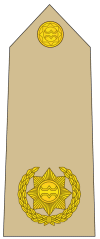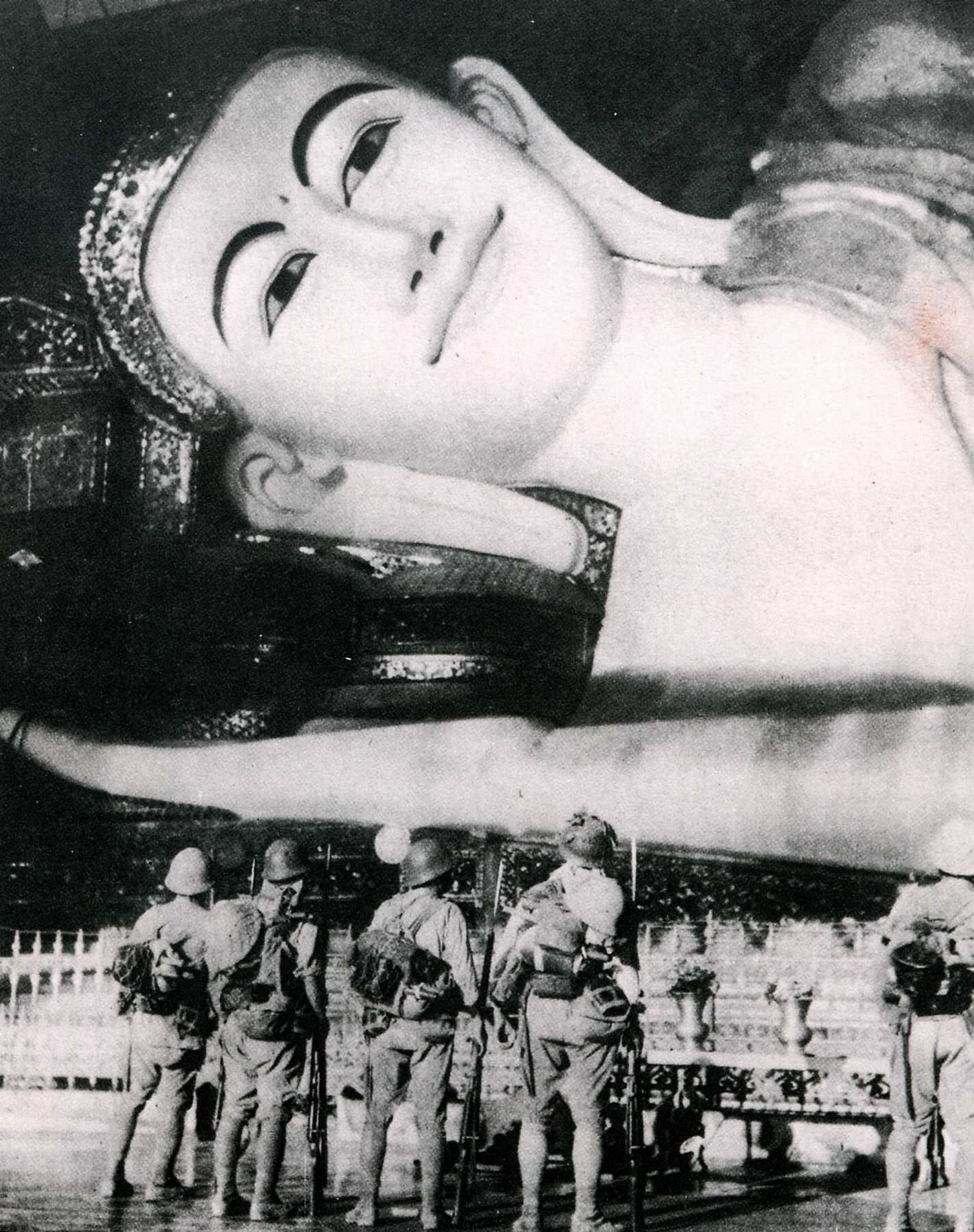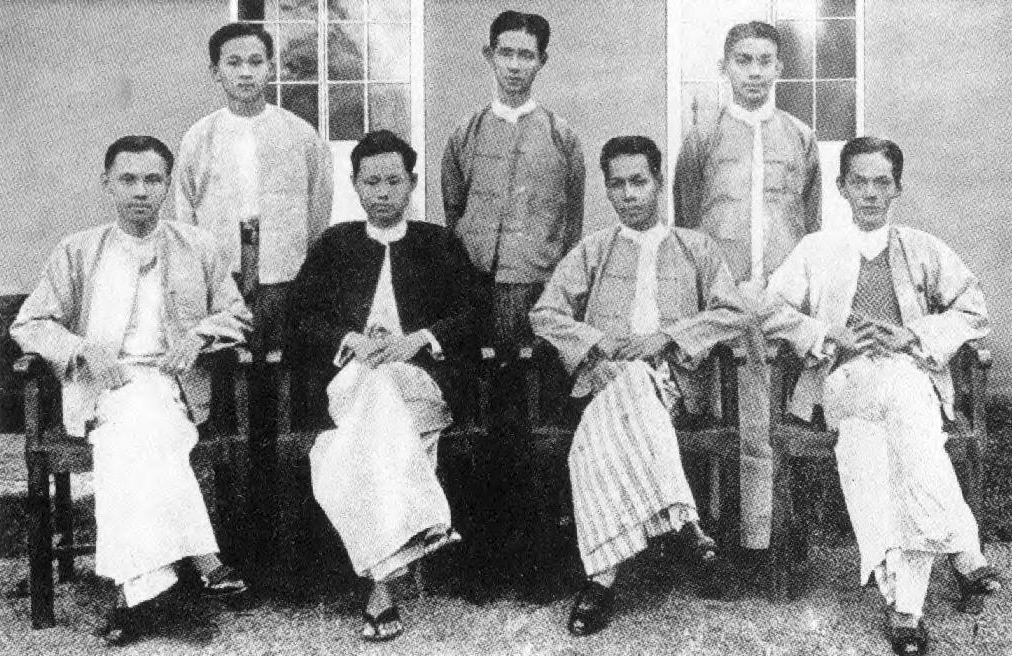|
Aung Shwe
Brigadier General Aung Shwe ( my, အောင်ရွှေ; 19 May 1919 – 13 August 2017) was a Burmese politician and a member of General Ne Win's Burma Rifles rising to Brigadier General. He was one of the founders and former President of the National League for Democracy who took charge of the party when Aung San Suu Kyi and Tin Oo were under house arrest in the early 1990s and 2000s. Early life and education Aung Shwe was born in Rangoon, British rule in Burma, British Burma to Phoe Con and Daw Thein. He graduated in arts from Rangoon University in 1940. From 1942 to 1945, he served under the leadership of General Aung San's Burma National Army, Burma Independence Army, Burma Defence Army and Patriotic Burmese Forces during the Japanese occupation of Burma. Aung Shwe joined the Myanmar Army, Burmese army in 1945. Military and governmental career Aung Shwe played a role in the 1958 caretaker government and served as a high-ranking military officer led by General Ne Win. ... [...More Info...] [...Related Items...] OR: [Wikipedia] [Google] [Baidu] |
National League For Democracy
The National League for Democracy ( my, အမျိုးသား ဒီမိုကရေစီ အဖွဲ့ချုပ်, ; Abbreviation, abbr. NLD; Burmese abbr. ဒီချုပ်) is a liberal democratic political party in Myanmar (Burma). It became the country's ruling party after a landslide victory in the 2015 Myanmar general election, 2015 general election but was overthrown in a 2021 Myanmar coup d'état, military coup d'état in early 2021 following another landslide 2020 Myanmar general election, election victory in 2020. Founded on 27 September 1988, it has become one of the most influential parties in Myanmar's pro-democracy movement. Aung San Suu Kyi, the former State Counsellor of Myanmar, serves as its chairperson. The party won a substantial parliamentary majority in the 1990 Myanmar general election. However, the ruling State Peace and Development Council, military junta refused to recognise the result. On 6 May 2010, the party was declared illegal ... [...More Info...] [...Related Items...] OR: [Wikipedia] [Google] [Baidu] |
The Irrawaddy
''The Irrawaddy'' () is a news website by the Irrawaddy Publishing Group (IPG), founded in 1990 by Burmese exiles living in Thailand. From its inception, ''The Irrawaddy'' has taken an independent stance on Burmese politics. As a publication produced by former Burmese activists who fled violent crackdowns on anti-military protests in 1988, it has always been closely associated with the pro-democracy movement, although it remains unaffiliated with any of the political groups that have emerged since the 8888 Uprising. ''The Irrawaddy'' is published in both English and Burmese, with a primary focus on Burma and Southeast Asia. It is regarded as one of the foremost journalistic publications dealing with political, social, economic and cultural developments in Burma. In addition to news, it features in-depth political analysis and interviews with a wide range of Burma experts, business leaders, democracy activists and other influential figures. History It was started in 1990 with t ... [...More Info...] [...Related Items...] OR: [Wikipedia] [Google] [Baidu] |
Yangon Region
Yangon Region(, ; formerly Rangoon Division and Yangon Division) is an administrative region of Myanmar. Located in the heart of Lower Myanmar, the division is bordered by Bago Region to the north and east, the Gulf of Martaban to the south, and Ayeyarwady Region to the west. Yangon Region is dominated by its capital city of Yangon, the former national capital and the largest city in the country. Other important cities are Thanlyin and Twante. The division is the most developed region of the country and the main international gateway. The division measures . History The region was historically populated by the Mon. Politically, the area was controlled by Mon kingdoms prior to 1057, and after 1057, with few exceptions, by Burman kingdoms from the north. The control of the region reverted to Pegu-based Mon kingdoms in the 13th to 16th centuries (1287–1539) and briefly in the 18th century (1740–57). The Portuguese were in control of Thanlyin (Syriam) and the surrounding ... [...More Info...] [...Related Items...] OR: [Wikipedia] [Google] [Baidu] |
Burma Socialist Programme Party
The Burma Socialist Programme Party (BSPP), ; abbreviated , was Burma's ruling party from 1962 to 1988 and sole legal party from 1964 to 1988. Party chairman Ne Win overthrew the country's democratically elected government in a coup d'état on 2 March 1962. For the next 26 years, the BSPP governed Burma under a totalitarian military dictatorship, until mass protests in 1988 pressured party officials to adopt a multi-party system. Founding and programme The BSPP was established on 4 July 1962, after the declaration of the "Burmese Way to Socialism" (BWS) by the Union Revolutionary Council (URC) on 30 April 1962. The BWS set out the political and economic ideology of the URC which had taken over power in the military coup of 2 March 1962. The BSPP advocated a programme of the "Burmese Way to Socialism" which, according to Ne Win, incorporated elements of Buddhism, humanism, and Marxism. The programme was described by some scholars as anti-Western and isolationist. A b ... [...More Info...] [...Related Items...] OR: [Wikipedia] [Google] [Baidu] |
Myanmese Ambassador To France
The Myanmar Ambassador in Paris is the official representative of the Government in Naypyidaw to the Government of France and concurrently to the UNESCO, the governments in Madrid and Lisbon. History *Since 1989 Union of Myanmar List of representatives /ref> See also * France–Myanmar relationsReferences {{Ambassadors of Myanmar Ambassadors of Myanmar to France, Lists of ambassadors of Myanmar, France Lists of ambassadors to France, Myanmar ...[...More Info...] [...Related Items...] OR: [Wikipedia] [Google] [Baidu] |
1962 Burmese Coup D'état
The 1962 Burmese coup d'état on 2 March 1962 marked the beginning of one-party rule and the political dominance of the army in Burma (now Myanmar) which spanned the course of 26 years. In the coup, the military replaced the civilian AFPFL-government, headed by Prime Minister U Nu, with the Union Revolutionary Council, Chaired by General Ne Win. In the first 12 years following the coup, the country was ruled under martial law, and saw a significant expansion in the military's role in the national economy, politics, and state bureaucracy. Following the constitution of 1974, the Revolutionary Council handed over power to the elected government, consisting of a single-party, the Burma Socialist Programme Party, which had been founded by the council in 1962. The elected government remained hybrid between civilian and military, until 18 September 1988, when the military again took over power as the State Law and Order Restoration Council (then renamed the State Peace and Develop ... [...More Info...] [...Related Items...] OR: [Wikipedia] [Google] [Baidu] |
Commander
Commander (commonly abbreviated as Cmdr.) is a common naval officer rank. Commander is also used as a rank or title in other formal organizations, including several police forces. In several countries this naval rank is termed frigate captain. Commander is also a generic term for an officer commanding any armed forces unit, for example "platoon commander", "brigade commander" and "squadron commander". In the police, terms such as "borough commander" and "incident commander" are used. Commander as a naval and air force rank Commander is a rank used in navies but is very rarely used as a rank in armies. The title, originally "master and commander", originated in the 18th century to describe naval officers who commanded ships of war too large to be commanded by a lieutenant but too small to warrant the assignment of a post-captain and (before about 1770) a sailing master; the commanding officer served as his own master. In practice, these were usually unrated sloops-of-war of no ... [...More Info...] [...Related Items...] OR: [Wikipedia] [Google] [Baidu] |
Caretaker Government
A caretaker government is a temporary ''ad hoc'' government that performs some governmental duties and functions in a country until a regular government is elected or formed. Depending on specific practice, it usually consists of either randomly selected or approved members of parliament or outgoing members until their dismissal. Caretaker governments in representative democracies are usually limited in their function, serving only to maintain the '' status quo'', rather than truly govern and propose new legislation. Unlike the government it is meant to temporarily replace, a caretaker government does not have a legitimate mandate (electoral approval) to exercise aforementioned functions. Definition Caretaker governments may be put in place when a government in a parliamentary system is defeated in a motion of no confidence, or in the case when the house to which the government is responsible is dissolved, to be in place for an interim period until an election is held and a new ... [...More Info...] [...Related Items...] OR: [Wikipedia] [Google] [Baidu] |
Japanese Occupation Of Burma
The Japanese occupation of Burma was the period between 1942 and 1945 during World War II, when Burma was occupied by the Empire of Japan. The Japanese had assisted formation of the Burma Independence Army, and trained the Thirty Comrades, who were the founders of the modern Armed Forces (''Tatmadaw''). The Burmese hoped to gain support of the Japanese in expelling the British, so that Burma could become independent.Micheal Clodfelter. Warfare and Armed Conflicts: A Statistical Reference to Casualty and Other Figures, 1500–2000. 2nd Ed. 2002 . p. 556Werner Gruhl, Imperial Japan's World War Two, 1931–1945 Transaction 2007 (Werner Gruhl is former chief of NASA's Cost and Economic Analysis Branch with a lifetime interest in the study of the First and Second World Wars.) In 1942, Japan invaded Burma and nominally declared the colony independent as the ''State of Burma'' on 17 May 1942. A puppet government led by Ba Maw was installed. However, many Burmese began to believe the ... [...More Info...] [...Related Items...] OR: [Wikipedia] [Google] [Baidu] |
Burma National Army
The Burma Independence Army (BIA), was a collaborationist and revolutionary army that fought for the end of British rule in Burma by assisting the Japanese in their conquest of the country in 1942 during World War II. It was the first post-colonial army in Burmese history. The BIA was formed from group known as the Thirty Comrades under the auspices of the Imperial Japanese Army after training the Burmese nationalists in 1941. The BIA's attempts at establishing a government during the invasion led to it being dissolved by the Japanese and the smaller Burma Defence Army (BDA) formed in its place. As Japan guided Burma towards nominal independence, the BDA was expanded into the Burma National Army (BNA) of the State of Burma, a puppet state under Ba Maw, in 1943.Donald M. Seekins, ''Historical Dictionary of Burma (Myanmar)'' (Scarecrow Press, 2006), 123–26 and 354. After secret contact with the British during 1944, on 27 March 1945, the BNA revolted against the Japanese. The ... [...More Info...] [...Related Items...] OR: [Wikipedia] [Google] [Baidu] |
Aung San
Aung San (, ; 13 February 191519 July 1947) was a Burmese politician, independence activist and revolutionary. He was instrumental in Myanmar's struggle for independence from British rule, but he was assassinated just six months before his goal was realized. Aung San is considered the founder of modern-day Myanmar and the Tatmadaw (the country's armed forces), and is commonly referred to by the titles "Father of the Nation", "Father of Independence", and "Father of the Tatmadaw". Devoted to ending British Colonial rule in Burma, Aung San founded or was closely associated with many Burmese political groups and movements and explored various schools of political thought throughout his life. He was a life-long anti-imperialist and studied socialism as a student. In his first year of university he was elected to the executive committee of the Rangoon University Students' Union and served as the editor of its newspaper. He joined the Thakin Society in 1938 and served as its gener ... [...More Info...] [...Related Items...] OR: [Wikipedia] [Google] [Baidu] |




